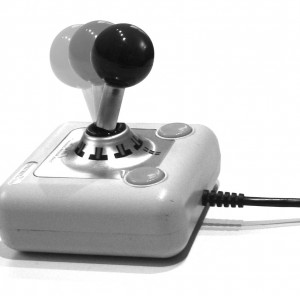Rule 1: Adults do not play games, therefore Australia does not require an adult rating on computer games, and any game requiring an adult rating will be automatically banned in Australia.

Joysticks Image supplied by Rebecca Cannon.
Game Hint: Breaking this rule requires supporting the Electronic Frontiers of Australia in their efforts to ‘protect and promote on-live civil liberties’, by amending current OFLC games censorship legislation to provide a desperately needed Adult computer game rating, and a better understanding of intellectual genres of computer games such as conceptual, literary, educational and documentary. In doing so we might hope that Kirsty Baird’s educational documentary game Street Survivor, will not be banned before reaching its target audience: teens at risk of homelessness – unlike the game NARC, which also incorporates drug use as an element of game play, and as a result was banned in Australia before it was even completed.
Rule 2: According to Microsoft’s Chief Strategist, releasing source code into the public domain is “unhealthy”, causes security risks and “as history has shown, while this type of model may have a place, it isn’t successful in building a mass market and making powerful, easy-to-use software broadly accessible to consumers.”
Game Hint: Linus Torvald’s revolutionary operating system Linux has provided millions of software consumers with a stable, secure, reliable alternative to Microsoft’s software oligopoly. Richard Stallman’s ground breaking Free Software Foundation has developed a legally binding GNU licensing alternative to the traditional, limited notions of Copyright and software patenting. These and other efforts of the open source community have resulted in valuable applications such as Open Office (Office suite), Inknote (Illustrator), Gimp (Photoshop), Blender (3D modeller), Ogre (3D engine), Python (media-based scripting language), allowing game developers and modders to produce new, inventive and robust games and game-based artworks. With the freedom to edit open sourced game wares and generally experiment with code innovation, artists Julian Oliver and Pix have been able to develop internationally applauded experimental virtual environments like fijuu. Importantly, this provides any artists who are interested in using their tools with a free, new locale for extensible collaborations / permutations / and unions in live 3D audio-visual performance.
Rule 3: Capitalism is the only sustainable economy.
Game Hint: Mixed Economies are set to become the Industrial Revolution of the 21st Century. Adopted no where else as fervently as within the independent computer games market, a Mixed Economy which allows Free Market exchange whilst valuing the long term sustainability of Fair Trade practices, is rapidly being identified as a profitable method for increasing product longevity. First recognised by early game developers, this hybrid market has already spread to the clothing and food production industries. One of the first, most powerful examples of an intelligent Fair Trade / Free Market economy, was the release of Valve Studios’ commercial Half Life code. This open sorcery saw a resurrection of interest in the game, as players warmed to the abundance of new maps and scenarios that were quickly available in the modding community. Not only did this technique extend the shelf life of the product, it also produced a highly skilled, unpaid workforce who generated new games of such high quality that their work could be bought back by Valve and re-released as commercial products in their own right.
Rule 4: Games are not art.
Game Hint: Despite the Australian government’s naïvety towards the digital arts, our arts culture is respectably the greatest supporter of computer games as a significant, digital art form. We spawned the first online archive of art games (http://www.selectparks.net). We can boast the first public library with an accessible collection of computer games (http://www.slv.vic.gov.au/about/visiting/spaces/experimedia). We are proudly home to the world’s first permanent, dedicated museum for exploring game culture (http://www.acmi.net.au/games_lab.jsp). We instigated the world’s most genuine, independent games developers conference (http://www.free-play.org/). And we have provided a cultural environment in which the largest collection of artists working in this field can produce the most innovative games and game-based artworks.
Unfortunately, given the latest strange twists in public funding for computer games, (where dollars are now only going to projects which can prove they don’t actually need it; by having already sold their product to a distributor) of our most experimental and innovative games, few will see the light of post-demo production. Significantly, most of the artists who have produced these experimental demos have left for foreign shores, where they may be freed of insanely high tax rates, and yet still receive a professional level of funding to continue their current games research full time.
Rule 5: The Rules cannot be broken.
Game Hint: You only play life once; write your own rules.
Rebecca Cannon
Rebecca Cannon is an Australian digital media artist, curator and writer with a keen interest in computer games as an art form, the politics of software licensing, censorship, and freedom of information. She currently curates the online archive of art games, Selectparks, works in research and development at Ericsson, and enjoys curating and editing cultural projects in her spare time.
Read More
http://www.efa.org.au/
http://www.selectparks.net
http://www.slv.vic.gov.au/about/visiting/spaces/experimedia
http://www.acmi.net.au/games_lab.jsp
http://www.free-play.org/
 This work is licensed under a Creative Commons Attribution-NonCommercial-ShareAlike 2.5 Australia.
This work is licensed under a Creative Commons Attribution-NonCommercial-ShareAlike 2.5 Australia.






